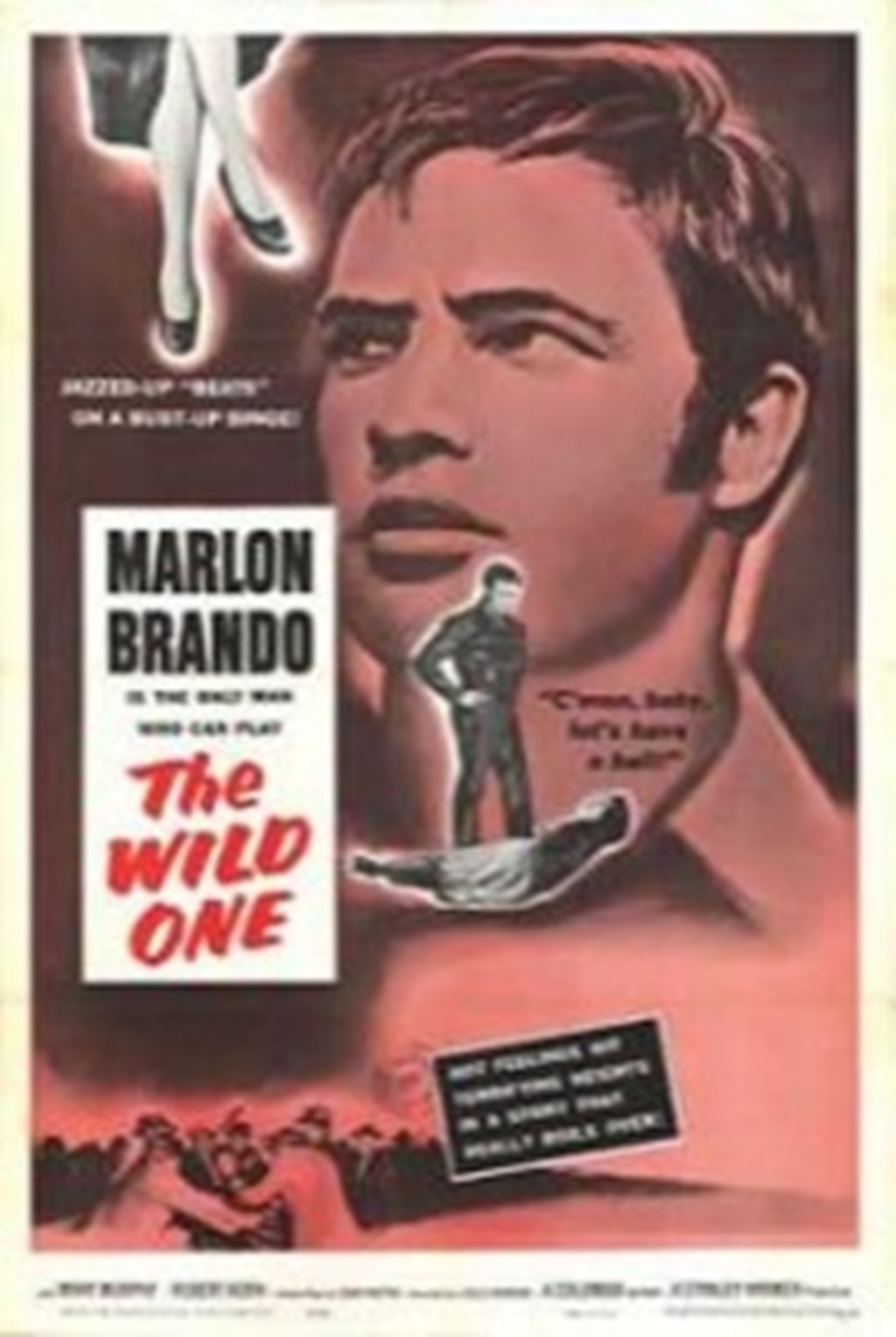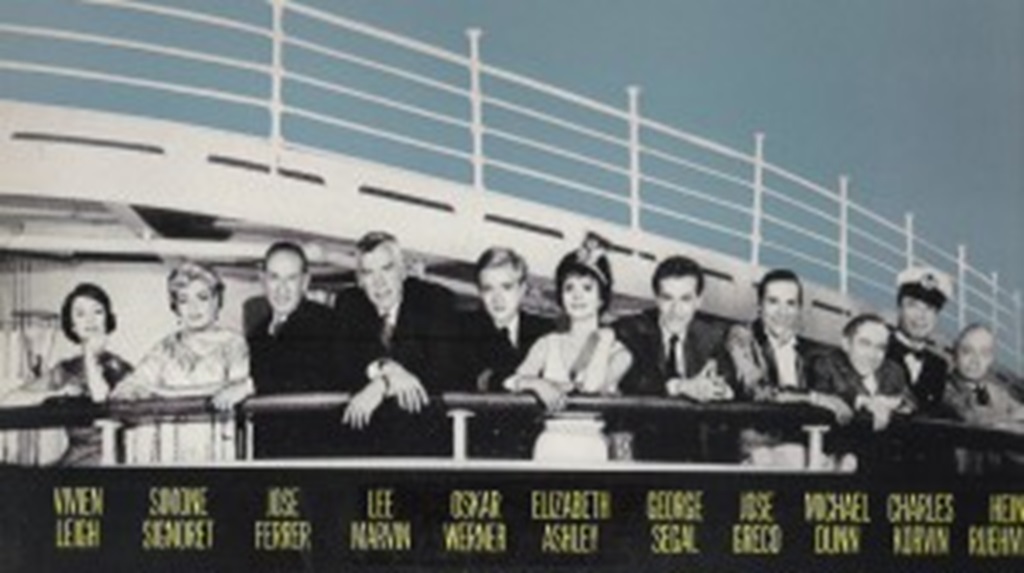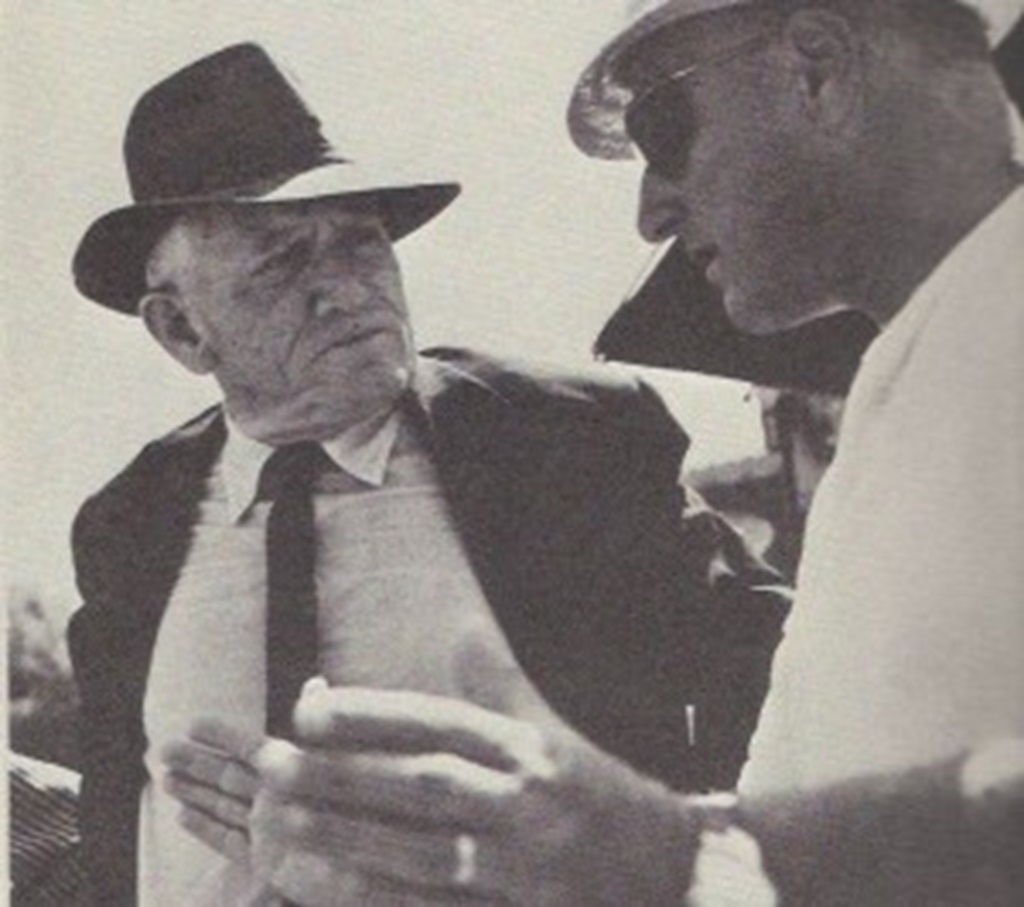I often express that the most rewarding aspect of my writing career is engaging with revered individuals about their work. One such memorable encounter took place in November 1994 when I had the privilege of meeting Stanley Kramer at the iconic Sportsman’s Lodge.
Although the interview primarily focused on my book “Lee Marvin Point Blank,” which centered around Marvin, my discussion with the pioneering producer/director naturally delved into other areas.
While most of Kramer’s insights on Marvin were incorporated into my book, the opportunity to converse with this esteemed filmmaker led to a wealth of additional thoughts, anecdotes, and candid reflections.
Regrettably, Kramer passed away in 2001, coincidentally on Lee Marvin’s birthday, leaving behind a treasure trove of viewpoints and musings that continue to hold immense value.
Also Read More: Pardis Saremi Parents: Who Are They? Family Details
An Inside Look at Stanley Kramer’s Filmmaking Journey
Dwayne Epstein: In 1952, you produced a film called Eight Iron Men based on a play. Lee Marvin was in that, right?
Stanley Kramer: Yeah, he was. I used him several times after that, but I don’t remember much about that particular film.
D: What qualities in a script would make you think Lee Marvin could play the part?
S: My natural sense of genius. I mean, why do you cast? You cast out of ego, too. People say to me, “Why did you use Gene Kelly?”
Or “Why did you use Fred Astaire in a dramatic part?” or “Why did you make the first picture with Marlon Brando?” Because I felt that I was doing something special.
D: And you were.
S: Not always.
D: You had the guts to try something different, at least.
S: Try, yeah. That’s why I got into it.
D: How did Lee Marvin and Brando get along?
S: Not too well. Brando had done Streetcar and a couple of other things. I was the only one who made two films with him that didn’t make any money.
D: I always thought The Wild One (1954) was a big hit.
S: It was banned in more places than it played.

D: Was there a rivalry between the two actors that transferred to the screen?
S: Since they played the heads of rival gangs, they played it that way.
D: Lee hid behind his personality?
S: He created a personality and hid behind it. He wasn’t that way at all.
D: What was he then?
S: Soft. Sensitive. Easy to hurt.
D: You saw that side of him?
S: I lived that side with him. I must have done about five pictures with him.
D: How would that sensitive side show itself?
S: Sometimes with another actor or actress. Sometimes, with a director. It would depend. He wanted to do a good job much more desperately than his personality indicated.
D: So there was a sense of insecurity about him?
S: Sure, but he was very talented.
D: Having worked on The Caine Mutiny (1954), would you say there was a comparison between Bogart and Lee Marvin?
S: I don’t think so.
D: How would they be different?
S: Well, Bogart was a star incarnate from the beginning. For example, the first time I ever got together with Bogart was in Hawaii, The Beachcomber’s Restaurant.
About three of us were at the table, and the f,ilm was starting rehearsals the following day. We had all been settled in there for about three or four days.
Around 11:00, I looked at my watch and said, “For all the guys that have to work tomorrow, I think it’s time to turn it in.” Bogart said, “Wait a minute. What do you fancy yourself to be?
Who are you, the producer of this picture? For Christ’s sake, dictating the time to go to bed and everything, that’s ridiculous! What’s your function here?” Fortunately, I thought of a line.
I said, “My function is to see that recalcitrant actors get to bed on time.” He looked at me and just stared at me.
Then, he broke out in a laugh. He said, “Okay.” That was all just before we started The Caine Mutiny.
D: Do you remember if Lee Marvin got along with Bogart? I know he was enamored of Bogart.
S: Right, he was. I don’t remember. Too many other things going on.
D: Lee Marvin had a small part in the first film you directed, Not As A Stranger, with Robert Mitchum.
What was it like working with him then? It was a pretty volatile cast with Sinatra, Mitchum, Broderick Crawford….
S: I don’t recollect. You’ll have to make it up.
D: [laughs] I won’t do that. Some critics said Gene Kelly was miscast in Inherit the Wind (1960). I thought he was beautiful in that.
S: I did, too. It’s hard to find reasons for the movie’s failure, except I know some of them.
United Artists never went all the way down the line with it, to open it and do it, exploit it. It needed that. I thought Tracy and March would carry it, you know?
D: They were like titans.
S: They were titans, too. They had respect. That was a wonderful experience for me. Sometimes it goes, sometimes it doesn’t.

When I worked on Guess Who’s Coming to Dinner (1967), everybody said, “Christ, this will fold like an accordion.” Yet, they stood opposite each other. The guy kissed the girl in the opening scene.
D: The world didn’t come to an end.
S: No, maybe we’d have made more money if it had. If you have any personal questions, feel free to ask me.
D: What do you look for in a script? You have a particular style of filmmaking, as all great directors do…
S: No, I don’t.
D: I think you do. I think you have a film that says Stanley Kramer on it.
D: How do you… That’s why I made a picture, the picture I made was It’s a Mad, Mad, Mad, World (1963). That’s not a Stanley Kramer picture.
S: Right, since now and again, you got to break the mold. No question about that. But chances are if there’s a film that says Stanley Kramer on it, it won’t be a light piece of fluff. You tackled tough subjects mainly…
D: I didn’t think they were so tough when I tackled them. I made them because I believed in them, visualized them, and thought, “Well, I could do this.
Make a great thing out of it.” Doesn’t always turn out that way. That’s what makes a Christian out of you.
S: What do you look for in a script when you read it?
D: I don’t look for anything in particular. Surprise me! Shock me! Stun me! Intrigue me! Do something!
I don’t know whether it jumps off the page, but maybe I can visualize something. It wouldn’t be perfect if it jumps off the page.
D: Have you ever considered directing a play instead of just films? You seem to be an outstanding actor’s director.
S: Well, then the film would be the showcase. But nobody ever offered me a play script, and I never thought of one, so… I’ve directed stage productions, workouts, locally, and so forth.
D: When you cast Burt Lancaster as the judge on trial in Judgment at Nuremberg, was there a chance of casting Lee Marvin in that or any role in the film?
S: I’m sure I did along the way. Maybe there was some reason why he wasn’t in it.
See, I had Tracy near the end of his life, since it was an all-star cast, I did that so I could get try to get an audience where it all jelled, because it never did sufficiently.
We got an audience, but not enough. Lancaster was a replacement. That part was set and agreed to, and everything was negotiated for Olivier to play. He got married.
He married Joan Plowright. He said, “Unless you can postpone the picture for four months, it’s out.” I couldn’t.
At any rate, Lancaster was one of those nasty…It didn’t work entirely because everybody else had a background of being German, Schell, and all the defendants. But Lancaster read it and wanted it. I wouldn’t say I liked the accent he played with.
D: He tried.
S: He tried, and he performed pretty well.
D: You produced John Cassavetes’ first studio film, A Child is Waiting (1963). I’m guessing he preferred his independent projects, so he wasn’t crazy about the experience.
S: He wasn’t crazy about the experience because of me, probably. We had difficulties. He was a talented fellow.
Otherwise, I wouldn’t have put him in the job. But I had a self-centered idea about films. There can only be one dominant, and you can’t do it by conference or agreement. One guy has the concept and the driving force.
That’s what I always felt to be accurate, anyhow. Cassavetes was young, unregimented, not accustomed to listening, and I was in his ear a lot. It was a project I would have done. I was busy on something else.
I didn’t direct it because I made the project go up to that point, but it was the kind of subject most people wouldn’t be interested in. We used a lot of people from the hospital.
D: Burt Lancaster played the head of the hospital, but would you have considered Lee Marvin for Lancaster’s role as the lead?
S: Yeah, I would have considered Lee Marvin for anything. I thought he was a hell of an actor.
D: Do you recall if you did or not for that role?
S: Probably not, because Lancaster was a much bigger name. Some of those subjects needed a symphony of names. It’s always a confining thing.
In the early days, Marlon Brando had never made a good film. Kirk Douglas hadn’t done anything, and that was good.
There were other people. Jose Ferrer was not known in films. Gary Cooper was, but Grace Kelly wasn’t. I had used a lot of people exciting in those days. Then, I began to switch cast, vis a vis Astaire or Gene Kelly, that kind of thing…dancers [laughs].
D: On Ship of Fools (1965), how did Lee Marvin get along with Vivien Leigh?
S: I don’t know if there was anything personal between them. I would be the last one to ask about that.
But, he got along very well. After all, he was a queer duck. Meeting him for the first time, for an actor who’s supposed to be playing with him, it must have been an experience for her, too. I’m sure it was.
D: Would you say there was mutual respect for talent?
S: The respect that he had for her was unbelievable. What her respect was for him, I don’t know.
D: How did Lee Marvin get the part in Ship of Fools?
S: I picked him. If you ask me on what basis, I don’t know. Usually, casting is a feeling. [pause] I can’t stress enough that he was two people.
He had an outer facade and this terrible, sensitive, introspective underneath. How do you deal with that as an actor? It’s not easy.
He was very respectful of Vivien Leigh. I remember the first scene they played together very well because of Marvin. He entered the dining room, crossed the room, and sat down at the table.
D: That’s right.
S: How do you know that’s right?
D: I’ve seen the movie several times. Wasn’t it the scene where he’s at the table and she comes in, and he doesn’t get up for Vivien Leigh, who sarcastically says, ‘Don’t get up.’?
S: You’ve seen it more recently. At any rate, he worked out the lines, how to cope with it, and then did me the honor of discussing it.
He often did that, very often. This was always deep with him because he had something profound to say that people ought to listen to — he always seemed so surface amuck or rough.
When you bear that, lift the curtain, and look behind it, there is much to see.
D: So you’re saying there was much more depth to the man than people realized?
S: Not only much more depth, but he was sensitive underneath. His sensitivity he protected as best he could. I always gave him credit for his intelligence.
I remember…let me think a minute. I constantly had a feeling he left too soon. I think he had a lot more to say and do; I feel that. I don’t think he ever crested, is what I mean.
D: Have you seen a film in recent years and thought Lee Marvin could’ve done it?
S: Well, it wouldn’t be that obvious. I made a picture once called On the Beach (1959). Fred Astaire played a scientist in it.
Everyone said, “What the hell is Fred Astaire doing in this? Can’t visualize it.” I visualize it somewhere along the line. I think he came through very well. It would be the same with Marvin.
If Marvin, for example, played a hard…I often look for a role for something like a football coach or a college instructor, so I could use him and stand out from that.
D: Anthony Quinn in RPM (1970) was a college instructor. Did you consider Marvin for that role?
S: I don’t remember that. It was a gigantic failure. That’s what I remember most.
D: It was a game effort.
S: Unfortunately, you don’t get points for that. I’ve had a lot of game efforts [laughs].
D: During Ship of Fools, is there anything else that stands out in your mind?
S: Well, I had a conglomeration of people in the film, as you know. It was the only experience I had with an actor named Oskar Werner.

He happened to be one of the great actors of all time. He and Spencer Tracy, but I only made one picture with Oskar…He was very difficult for everybody.
I made a pact with him. If our objectives, our high objectives, were up there and clear to both of us, he’d get rid of all this crap and go for it, which he bought and did.
He would often do something and say to me something he had never said to anybody: “What do you think?” That was a significant concession for him.
D: How did he get along with the other actors?
S: Fairly well. He and Signoret got together, and I made a pact with them. They made a pact with each other: Drop the resentment and the dislike and let the roles dominate.
D: Seemed to work. Their love scenes seemed very believable.
S: Of course. So many other things I was satisfied with most of the way. I remember one day I had a scene with Vivien Leigh and she was drunk, she was playing it.
On her walk down the ship’s corridor, it occurred to us to do something, the Charleston. Just suddenly broke into it like it was on her mind.
And she did it and went off quickly. Then she went on her way to the cabin. That was my idea. I want credit for that one!
D: What have you been doing with yourself lately?
S: I’m preparing to make a picture, yeah. That’s one of the things I’m doing. I also wrote another book.
D: Anything you can tell me about the upcoming film?
S: Well, I can tell you it’s present time. I have two projects. The first one I’d like to be the story of modern Soviet Russia After the fall of the Soviet Union. It’s a good love story. I have to bring it up to date. Changes every month.
D: Any casting in mind?
S: Well, the guy who’s dogging me the most is Max Schell. The last time Max Schell and I got together, he won the Oscar. This is very special, too. Good love story.
D: You mentioned a new book. Is it on filmmaking or your own experiences?
S: Well, running through it is film anecdotes, motivations, agonies, prejudices.
D: Any of the later films that weren’t necessarily hit with critics or audiences, say, The Secret of Santa Vittoria (1969), that you may have reconsidered casting?
S: I don’t recall, maybe. Regarding casting, you have to have a big enough ego, and I had it. You visualize something, get an idea or a thought, and follow it through against the current. If it comes off, great. If it doesn’t, you made a mistake.
D: So, you’re saying casting against type worked much better for you?
S: No, it didn’t work much better, but it worked sometimes. Not always.
D: Can you think of an example where it failed?
S: Yeah, but I won’t tell you.
D: [Laughs] Okay, that’s fair. That seems like a good note to end on.
S: All right. Hope you got enough.
D: I sure did.
Also Read More: Pardis Saremi Parents: Who Are They? Family Details

